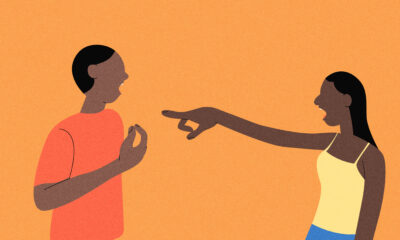Features
William Ifeanyi Moore: The Cycle of Association
 Of all the many seemingly weird and occasionally absurd things the father of psychoanalysis Sigmund Freud proposed to the world, his theories on association remains of the most useful ideas in understanding human behaviour, and hence predicting it. For the most part, we like to think that we want to do what will make us happy, but really, we just want to do what is familiar. This starts as early as our childhood years when we start to associate love with both the positive and negatives we pick up from our parents attitudes towards us and towards each other. This is why it is not uncommon that most molesters have been previously molested, and violent partners grew up in violent homes. Just ask Chris Brown, he will tell you.
Of all the many seemingly weird and occasionally absurd things the father of psychoanalysis Sigmund Freud proposed to the world, his theories on association remains of the most useful ideas in understanding human behaviour, and hence predicting it. For the most part, we like to think that we want to do what will make us happy, but really, we just want to do what is familiar. This starts as early as our childhood years when we start to associate love with both the positive and negatives we pick up from our parents attitudes towards us and towards each other. This is why it is not uncommon that most molesters have been previously molested, and violent partners grew up in violent homes. Just ask Chris Brown, he will tell you.
The problem with the cycle of association is that when we love someone, we are prone to the idea that once we get married or whatever next level of commitment you are planning, things will change. Most women would often assume this about a promiscuous spouse. Like you would marry this guy, and all of a sudden he will delete all those numbers on his phone, stop preying on women and all other playboy related behaviour. Or a man might assume that once he is married to this woman, she would see the need to make the house a home and stop being so self-obsessed, good luck to you.
To compound this problem, human behaviour tends to fall into a strange steady-state born out of habits that cumulate to form behaviours collectively identified as a person’s character. The problem is that these habits put us in a familiar emotional state where we feel relatively safe because it is what we are used to. For example, I’m sure you all know that guy/girl that is fond of dating partners with something peculiarly wrong about their lifestyle or character, or that person that always seems to be dating the same type even after countless heartbreaks. Then when a good guy/girl comes in with all the right motives and intentions, the person is actually scared. On the surface it might seem like this person is scared of commitment, but actually, the person is just scared of changing that emotional attachment they have with a turbulent situation. So in a sense, some of us are afraid of being happy because we have never known happiness and associate love with issues. This is why you must be careful how hard you criticise your parents – most of the time we end up just becoming them, or occasionally overcompensating in our bid to resist.
Perhaps as a self-improvement exercise you might want to take some time out today to make a list of your past partners and the traits they exhibit, then you can try to draw some similarities. Compare this to traits exhibited by people you blew-off, and then juxtapose the two to a list of ideal traits you would desire in a partner. You just might find that not only does your dating history often deviate from your ideal, but the ones you blew-off were even more in line. Needless to say, humans are often aware of what is good for us, but somehow remain incapable of mustering the will to walk this path. We can only hope that with self-awareness founded on self-knowledge, we can start to pick apart the parts of our mind that pull us towards the very life we ideally hope to avoid.
Photo Credit: Dreamstime | Monkey Business Images
























